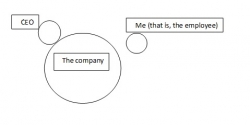Links to previous articles regarding company management can be found at the end of the article.
A farmer must work his fields
To achieve good crops, farmers must be aware of every aspect effecting the fields’ operation.
Before studying Engineering at the Israel institute of Technology – The Technion, and before moving towards industrial management, I used to manage the field crops of Kibbutz Shamir.
I had a team of employees which included one supervisor whose job was to monitor pesticides and one agricultural guide whose job was to visit the fields and report back to me. However, to succeed, I had to visit the fields in person and observe the ongoings with my own eyes.
The fields’ size was 2,300 dunams (568.341875 acre). I dedicated a few hours each day to visiting the fields and identifying problems on site.
Some companies outsource management of the fields or orchards and let others do the work for them. In these companies, the CEOs, who stay away from the fields, are not farmers. They are managers of businesses. These CEO positions are no different to any other CEO’s position in the industrial or commercial world.
What happens in the industrial and the commercial world?
A CEO of an industrial or commercial business is required to see a wide picture in real time. For that purpose, the CEO must maintain a dashboard of the KPIs (Key Performance Indicators). The dashboard visualizes the online picture.
A CEO I once met, who well understood the importance of measuring but could not maintain systematic, continuous measuring performance, excused himself by saying that he had strong intuition and knew his company well without measuring.
Intuition and gut feelings are valuable and important when making decisions. However, they do not replace measuring.
Measuring provides a daily, weekly, and monthly, accurate pictures of the situation. The measuring process reveals fallbacks and mishaps. It helps managers establish action plans which put the company back on track towards success.
Back to visiting the sites
Intuition does not replace measuring and measuring does not replace actual visits on site.
Even the best, most accurately measured KPIs cannot replace information CEOs receive when visiting the site i.e., the production floor, the sales department, RD&E department, exhibitions, and other encounters they may have with employees, customers and suppliers.
By meeting employees on site, CEOs increase employees’ motivation to succeed and employees’ commitment to the company success. The CEOs can assess the level of employees’ satisfaction from their work conditions, they can find hidden unemployment or negative currents, all of which is valuable information to guide the future.
However, visiting the sites may also have disadvantages which I will discuss later. First, let us look at a new trend of CEOs that is becoming more and more popular.
CEOs experiencing manual work
An article, “Making deliveries and moonlighting as barmen – A new generation of CEOs” was published on TheMarker in 2023. The article was about CEOs who work on site, as fieldmen. For example, Andy Pang, the manager & co-founder of DoorDash, who took a position of a delivery man and for some time had been delivering goods to customers.
The company, which operates in America, Canada, and Australia, employs more than six million delivery persons. Part of the employees are required to perform at least four deliveries per year.
Other companies mentioned in the article are Uber whose CEO, Dara Khosrowshahi, periodically drives people in an Uber taxi and Amazon which has recently renewed its “Associate Experience Week”, a program which encourages management level employees to experience field work during working hours. Amazon believes that the “Associate Experience Week” program enhances better understanding of the managerial tasks and therefore participating in the program is mandatory for some managers. The article presents more examples of companies which implement similar programs.
Why is it important to experience work on ground level?
Amazon’s “Associate Experience Week” program is a big step forward towards understanding what happens at the front line of the business.
DoorDash provides delivery service to restaurants. Since the deliveries generate the business earnings, managers will make better decisions after experiencing and understanding what happened on the ground.
The program reveals malfunction and faulty operational processes
Peng, manager, and co-founder of DoorDash was quoted saying that very soon after managers started performing actual deliveries, they had insights regarding what needed to be done to improve efficiency and provide better service.
I value this methodology and hope it reaches Israel. However, with all my respect and appreciation to the program, I must emphasize that, managers who do not use the time to seriously listen to employees, hear their ideas, their complaints and solutions, miss good opportunities to learn and to increase employees’ commitment to the business.
Amiram Levin: Creative thinking amongst the young generation
In the second chapter of the podcast “Big operations of the special units” Amiram Levin, who was the General Officer Commanding, Northern Command (Israel Defense Forces) is quoted saying about operation Grapes of wrath that “brains” are not always the sole property of the generals. High commanders and generals have knowledge and experience, he says, but young minds think creatively. First because young people’s brains are more active, second, because they can observe situations from angles that older people, who are set in their ways, may not consider and third, says Amiram Levien, when young people are asked to initiate a plan, they are more motivated and committed than when they are told what to do.
Every manager and CEO should learn from Amiram Levin’s wisdom and from the modesty of the CEOs presented in TheMarker article mentioned above.
What should never be done?
It is important to emphasize that CEOs should not interfere with site managers’ decisions or undermine their authority. CEOs must never give employees direct instructions, make negative remarks about employees’ conduct, or reprimand employees for disciplinary issues on site. The comments must be forwarded to the site managers to act upon.
CEOs must concentrate on chatting with employees, give positive feedback when deserved and encourage employees to succeeded. The random visits provide an unmediated view of what happens on the shop floor, the selling points, customer service centers etc. They create an important opportunity for CEOs to complement staff members and show their appreciation.
The same goes when CEOs meet customers. Meeting customers face to face provide important information. However, CEOs must be careful not to interfere with the field managers’ work by making customers believe they can approach the CEO directly for placing orders or complain. Maintaining the authority of field managers and agents will maintain the company’s success.
Summary and recommendations
TheMarker newspaper published an article last July which described CEOs of leading companies periodically leaving their high positions to perform “simple” jobs on site. Jobs like delivering meals from restaurants, driving taxies, renovating doors etc. The jobs that generate the company’s profit.
Experiencing work on the field provides CEOs good understanding of the processes and help reveal what can go wrong. It enhances empathy and cooperation from staff members and increase employees’ motivation and commitment to the company’s success.
Every visit, in which the manager is attentive and open minded, will provide management with valuable information they cannot gain otherwise. At the same time, it will improve employee’s motivation.
However, managers must control their desire to give instructions or negative feedback. They must concentrate on making eye contact, listen sincerely, and give positive feedback wherever possible. All other comments should reach the employees via their direct managers.
A good lesson can be learned from Amiram Levin’s experience and the ideas presented in The Marker’s article.
Links to articles regarding company management
- Important KPIs to run a business – part I: The KPI reports CEOs Regularly measure
- Important KPIs to run a business – Part II: Human Resources and Finance
- Extraordinary Management Decisions of CEOs
- How to Create and Measure Employee Motivation
- Are there female management positions?
- Is the CEO connected to the shop floor?
- Extraordinary Management Decisions of CEOs
- Five most common mistakes shared by CEOs
- The best way to manage employees during wartime
- How to run a business during wartime?












 My First Book: Manage! Best Value Practices for Effective Management
My First Book: Manage! Best Value Practices for Effective Management